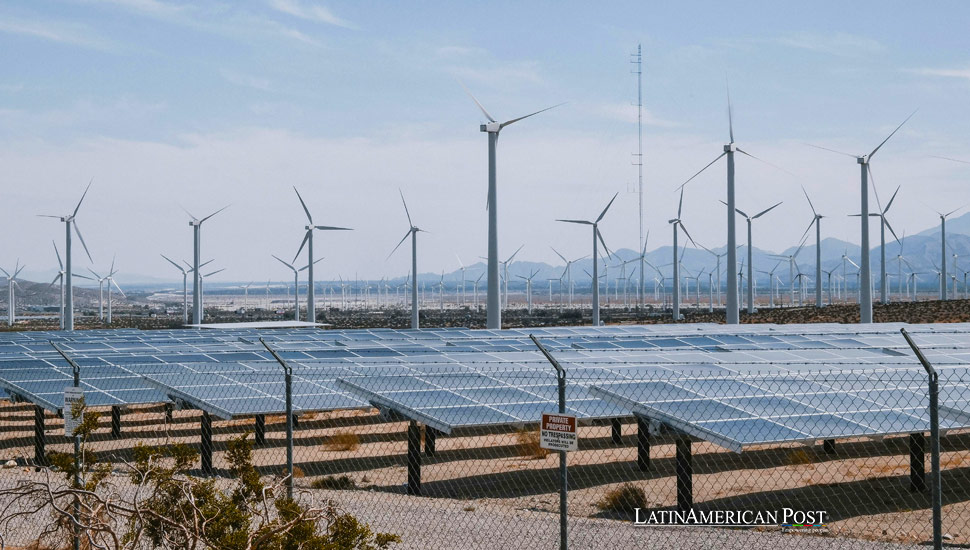Chinese Firm SPIC Invests in Wind and Solar Farms in Brazil

Chinese electricity company SPIC announced a $147.41 million investment in new wind and solar farms in Northeastern Brazil, aiming to become one of the country’s top energy generators. This move marks a significant step in Brazil’s renewable energy sector.
In a bold move to expand its presence in Brazil’s renewable energy sector, Chinese electricity company SPIC announced a 780 million reais ($147.41 million) investment in constructing two new wind farms in Northeastern Brazil. Additionally, SPIC has inaugurated two large solar parks, marking its debut in the country’s solar energy market. This investment aims to position SPIC as one of Brazil’s top three energy generators, according to Adriana Waltrick, CEO of SPIC’s Brazilian unit.
SPIC’s new wind farms will be built in the state of Rio Grande do Norte, a region known for its favorable wind conditions. These farms will have a combined installed capacity of 105.4 megawatts (MW), with construction expected to begin in January 2025 and operations starting the following year. The energy produced will be sold on the free energy market, a significant step towards diversifying Brazil’s energy sources and increasing the availability of renewable energy.
In addition to the wind projects, SPIC has inaugurated solar parks in the states of Piauí and Ceará, with a total capacity of 738 megawatts-peak (MWp). SPIC holds a 70% stake in these solar parks, which were initially developed by Recurrent Energy, a company formerly known as Canadian Solar. Solar plants receive an investment of 2 billion reais, and all the energy produced will be sold on the free energy market. Approximately 65% of this energy has already been secured under long-term contracts, with the remaining 35% to be negotiated under shorter-term deals.
A Strategic Move
“These projects demonstrate our appetite for Brazil and renewable energy sources,” said CEO Waltrick. SPIC currently has approximately 3,800 MW of installed capacity with assets in operation in Brazil, making the country one of its priority markets. This strategic investment highlights SPIC’s commitment to renewable energy and its goal to become a major player in Brazil’s energy market.
The company is also anticipating news from the Brazilian government regarding planned energy auctions for this year. SPIC has expressed interest in participating in potential bids for new hydroelectric plants should the government decide to resume such projects. Furthermore, SPIC is exploring the production of green hydrogen associated with the installation of offshore wind turbines, a technology the company has already mastered outside Brazil.
Brazil has a rich history of developing renewable energy, mainly hydroelectric power. Hydropower has been the backbone of the country’s energy infrastructure for decades, providing a significant portion of Brazil’s electricity. However, recent years have seen a shift towards diversifying energy sources, including more wind and solar power, driven by the need for energy security and environmental sustainability.
Brazil’s move towards renewable energy is part of a broader Latin American trend. Countries across the region are investing in renewable energy projects to reduce their reliance on fossil fuels and mitigate climate change’s impacts. This transition is supported by favorable natural conditions, such as abundant sunshine and strong winds, which make Latin America an ideal location for solar and wind energy projects.
The Role of Foreign Investment
Foreign investment has played a crucial role in the development of Brazil’s renewable energy sector. Companies like SPIC bring not only financial resources but also technological expertise and innovation. SPIC’s investment in Brazil is part of a larger pattern of Chinese investment in Latin America, which includes infrastructure projects, mining, and energy.
China’s involvement in Latin America’s renewable energy sector reflects its global strategy to expand its influence and secure energy resources. This strategy aligns with China’s Belt and Road Initiative, which aims to enhance international trade and infrastructure networks. By investing in Brazil, SPIC is contributing to the country’s energy transition while also advancing China’s economic interests.
While the investment in renewable energy presents numerous opportunities, it also comes with challenges. The construction and operation of new energy projects require navigating regulatory environments, securing financing, and managing community relations. Ensuring these projects benefit local communities and do not lead to environmental degradation is essential in Brazil.
The successful implementation of SPIC’s projects could serve as a model for other foreign investments in Brazil’s renewable energy sector. It demonstrates the potential for collaboration between international companies and local stakeholders to achieve sustainable development goals.
Looking Forward
The future of Brazil’s energy landscape looks promising with continued investments in renewable energy. The government’s support for renewable energy projects and private sector investment can drive significant advancements in the country’s energy infrastructure. SPIC’s projects are expected to contribute to Brazil’s goal of increasing the share of renewables in its energy mix, reducing greenhouse gas emissions, and promoting sustainable development.
As SPIC continues to expand its presence in Brazil, it will be essential to monitor the impact of these projects on the local economy and environment. Integrating renewable energy projects can enhance energy security, create jobs, and support economic growth.
Also read: Brazil Tackles Credit Card Debt with New Interest Rate Caps
SPIC’s investment in new wind and solar farms in Northeastern Brazil represents a significant step towards diversifying the country’s energy sources and increasing the availability of renewable energy. This move aligns with Brazil’s broader strategy to reduce its reliance on fossil fuels and promote sustainable development.
The collaboration between SPIC and Brazil highlights the importance of international partnerships in addressing global energy challenges. As the world transitions to a more sustainable energy future, investments like these will play a crucial role in shaping the energy landscape. The story of SPIC’s investment in Brazil is a testament to the potential of renewable energy to drive economic growth, enhance energy security, and combat climate change. It underscores the need for continued innovation, investment, and collaboration to achieve a sustainable and prosperous future.





